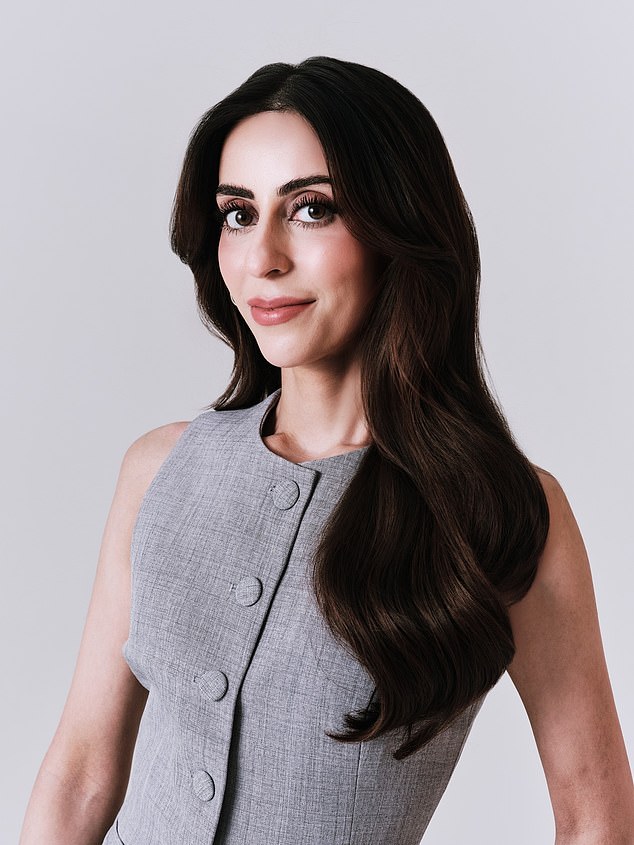[ad_1]
Experiencing hair loss? You’re not the only one. Dr Aamna Adel, a consultant dermatologist specialising in the condition, sees an increasing number of patients struggling with scalp and hair concerns. Her clinical observations, along with her personal experience with hair loss, motivated her to launch Rhute, a dermatologist-developed hairscience brand.
Its first product, a £55 scalp serum formulated with clinically-backed ingredients that promise to promote hair growth, boost scalp barrier and reduce flakiness, has sold out twice before, and last week’s restock racked up a 33,000-strong waitlist.

Dr Aamna Adel sees an increasing number of patients struggling with hair loss
But with so many products claiming to transform your scalp and a staggering number of hair loss misconceptions, how do you know what products and advice to buy into? Below, we asked Dr Adel to debunk (or confirm) nine of the most common myths around scalp health…
Myth 1: Washing your hair every day damages the scalp
Not true. In fact, washing your hair regularly can help keep your scalp balanced and healthy. Daily washing removes excess oil, product buildup, and even yeast that naturally accumulates on the scalp. That said, if you have a naturally dry scalp, using shampoos with harsh ingredients like sulphates can strip away too much oil and disrupt your scalp barrier.
Overall, washing your hair does not damage your scalp – it’s extremely beneficial when done with the right products for your hair type.
Myth 2: You should ‘train’ your scalp to produce less oil by washing less often
This is a myth. You can’t ‘train’ your scalp to produce less oil – oil production is regulated by your hormones, not by how often you wash your hair.
I often see this claim on social media, but reducing your wash frequency won’t make your scalp less oily over time. In fact, not washing your hair regularly can cause issues such as inflammation, buildup, and even hair thinning later.
Frequent and proper cleansing is key to maintaining both scalp and hair health.
Myth 3: Dandruff means your scalp is dry
This is a very common myth – but dandruff isn’t caused by dryness. In most cases, dandruff is linked to an overgrowth of yeast (Malassezia) that lives naturally on the scalp, which triggers inflammation and increased cell turnover. This leads to flaking that people often mistake for dryness.
In fact, dandruff tends to occur more in oilier scalps, as yeast feeds on the natural oils your scalp produces. So, while flakes can look dry, the underlying cause is usually an imbalance in the scalp microbiome – not a lack of moisture. Using targeted, antifungal shampoos and maintaining a consistent scalp care routine is the best way to manage it.
Myth 4: Natural oils (like coconut, rosemary or castor oil) can cure dandruff
Unfortunately, this is a myth. Dandruff is a long-term, chronic condition that can’t be ‘cured,’ but it can be managed effectively. The goal is to reduce the yeast (Malassezia) associated with dandruff using active ingredients such as antifungals or ingredients like pyrithione zinc, selenium sulfidic, or ketoconazole.

Natural oils alone can’t cure dandruff, says Dr Aamna Adel
In certain cases, such as scalp psoriasis, I may recommend using coconut oil to help soften scaling and ease discomfort – but natural oils alone can’t cure dandruff. Management and consistency are key.
Myth 5: Scalp massages make hair grow faster
There’s actually some truth to this one.
Studies suggest that massaging the scalp for 15-20 minutes a day can stimulate blood flow to the hair follicles, which may help encourage growth. So, while it’s not a miracle solution, regular scalp massages can be a simple, supportive step in a healthy hair routine.
Myth 6: Hair supplements like biotin can fix scalp problems
Generally, this is a myth. Scalp issues have many different causes, and supplements can’t address all of them. Most hair supplements are essentially multivitamins that include ingredients like biotin – but unless you have a proven deficiency, biotin isn’t particularly beneficial for hair growth. In fact, high doses may interfere with thyroid function.
There is emerging evidence that prebiotics may help balance the scalp microbiome, but this isn’t something I routinely recommend in-clinic just yet.
Myth 7: A tingling sensation means a scalp product is working
False. Tingling usually indicates irritation rather than effectiveness. The exception is when ingredients such as peppermint or menthol are included, as they can create a cooling or tingling feeling on the skin – but this is simply the result of the ingredient’s properties, not a sign that the product is working better.
If you experience tingling without these ingredients, it’s likely a sign of sensitivity.
Myth 8: You shouldn’t use conditioner on your scalp
This one is true. Conditioner is designed for the mid-lengths and ends of your hair, not the scalp. Applying it to the roots can make your hair feel heavy and cause it to become greasy more quickly.
Everyone should use conditioner, as it helps seal the hair cuticle, boost shine, and reduce frizz – just keep it away from the scalp for the best results.
Myth 9: Hair products can permanently change scalp health
It depends on the product and its ingredients. Products that strengthen and protect the scalp barrier can consistently improve scalp health over time – but consistency is essential.
Think of your scalp like the skin on your face: with regular care and the right ingredients, you can absolutely support long-term scalp health. Our Rhute Density + Repair Serum (£55) is designed to improve the scalp over time. Used consistently, it can support healthy density, hydration, balanced oil regulation, and reduced shedding, helping hair grow in its best possible conditions, but no product will permanently change scalp health after one use.
[ad_2]
This article was originally published by a www.dailymail.co.uk . Read the Original article here. .

